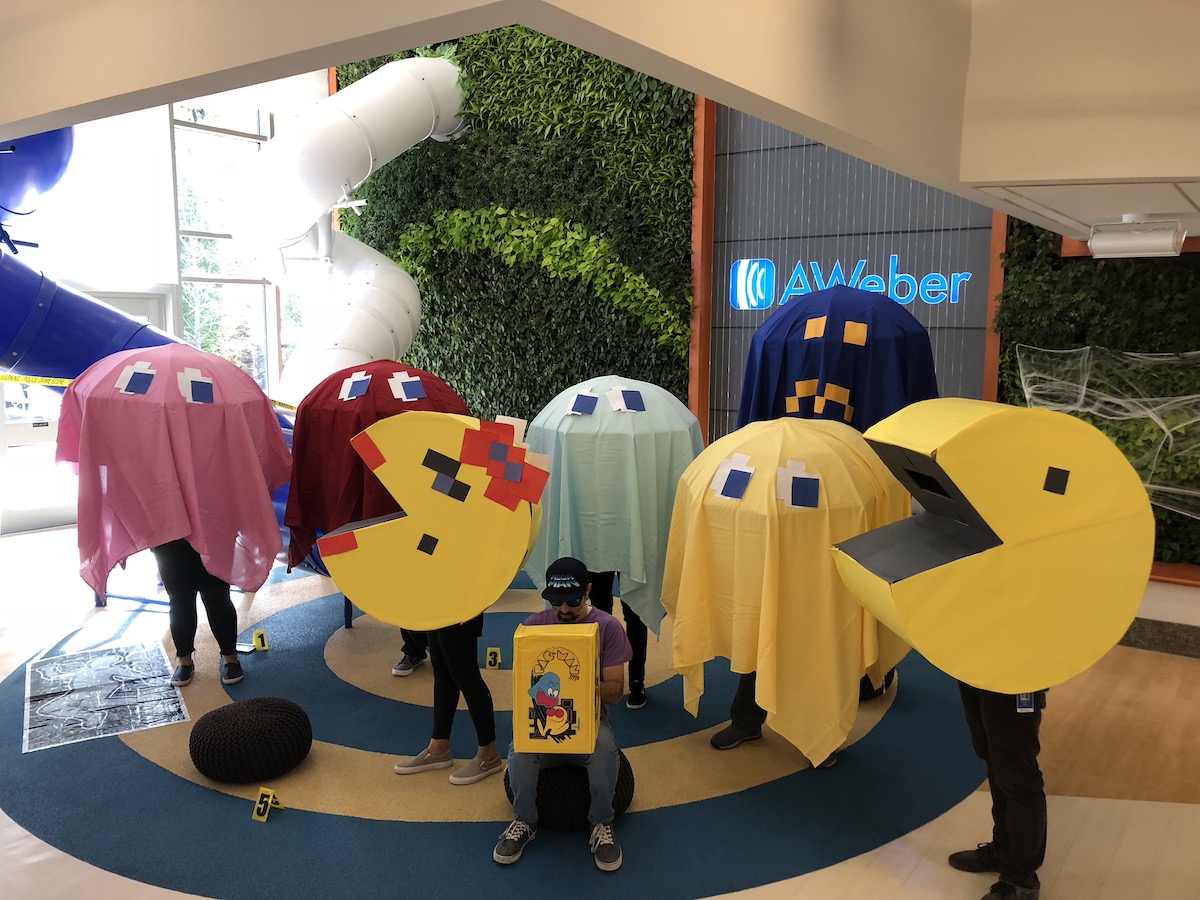Digitization positively impacts the way we work in many ways.
Communication software like Slack makes getting quick answers from team members easier. Video platforms like Zoom allow us to connect with anyone no matter our location. Performance management software lets us provide feedback and praise for each other on an ongoing basis.
But have we stopped to consider digitization’s negative impact on team members? When we communicate mostly through screens, can we really foster strong and healthy human interactions and team dynamics that enable growth for the company and its members?
At AWeber, we work on screens all day long — after all, we’re an email marketing company. However, we make it a priority to focus on online and offline communication. This is one of the reasons AWeber has been ranked one of the Best Places to Work in Pennsylvania so often: We’ve strived to build an environment that is engaged, energetic and collaborative, and where our team members truly understand one another.
Here, it’s expected that our 100 or so team members push each other. That they question one another. That they praise their fellow team members, provide ongoing feedback and participate in healthy conflict. And they do all of this regardless if they’re typing on a keyboard or sitting across the table from another team member.
So how do you create strong, collaborative teams when everyone is working behind screens? These are the three primary strategies that have helped us do just that in a digitized world.
Foster greater self-awareness at all levels.
You can’t have an open and collaborative team without open and collaborative team members. When each team member is aware of their communication patterns and behavior, teams develop a deeper level of trust and empathy.
It all comes down to nurturing self-awareness. During their onboarding process, AWeber team members learn about a personality test they took when they applied, called The Predictive Index (PI). The results shed light on a person’s motivations, and needs which predict their communication style and behaviors. It gives them a clear understanding of why they react the way they do when faced with certain situations or differing personalities.
The PI measures four main behavioral drivers: dominance, extraversion, patience and formality. Let’s say Michelle and Bob are two of your team members. If Michelle has a high level of formality, she’ll be highly organized and self-discipled. On the other hand, if Bob has low formality, then he may be more casual and informal when it comes to process. One is not better than the other, but if Bob and Michelle were unaware of their individual needs, friction and miscommunication could negatively impact their team dynamics. Michelle’s processes could be perceived by Bob as being restrictive while they are necessary for Michelle to stay on track.
However, when team members are self-aware and openly communicate their needs to others, this translates into more open dialogue and a more supportive culture rooted in relating to each other as humans — individuals with varying nuances and backgrounds and dispositions — first and foremost. At AWeber, team members constantly share their PI results with one another, post their results on the company’s intranet portal for anyone to see, and openly discuss their needs in meetings as well as in one-on-one discussions.
Work together toward shared goals.
Establishing cross-functional teams — regardless of whether teams work together in-person or online — enables people with different backgrounds to work together toward a common goal. It creates diversity of thought and fuels lively debates, healthy conversations and well-thought-out solutions for customers.
But it’s not just about working with different people on different teams. At AWeber, working cross-functionally means employees on a team buys into the same expectations, celebrates each others’ successes and understands setbacks. This results in a higher level of commitment to each other as well as to the team, and reinforces the reality that each team member has important opinions which are valued.
Cross-team collaboration happens at every level inside the company. AWeber managers from all teams come together twice a month to discuss ongoing projects, challenges and wins. They ask each other for advice and support, and brainstorm improvements as a group. As a result of these collaborations, the company has been able to ensure employees’ needs are met: For instance, we recently instituted a new review system to better support team members’ individual development paths and foster continual feedback.
Build relationships that aren’t tied to KPIs.
And, it’s not just about bringing teams together at work. We create an environment that truly cares, even when we sign offline. AWeber hosts quarterly events for team members and their families, like summer BBQs with petting zoos, holiday parties at unique venues in Philadelphia, or hayrides and pumpkin picking at a local farm. Additionally, we volunteer together in the community at local nonprofits. We have an Academy program that allows team members to teach each other about their passions, like home improvement, sewing and brewing beer, to name a few. A team of individuals that is recognized and supported daily for all of their uniqueness ultimately leads to an unstoppable, cohesive team.
Helping people understand the value in forming relationships based upon an understanding of our similarities and differences is key to creating a supportive team dynamic. While it takes time to build, a team dynamic that relies on human connection creates a mission-driven culture where people are empowered to make a real impact.







